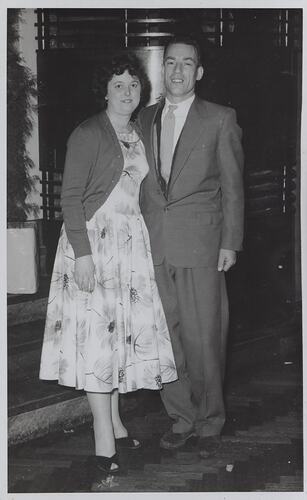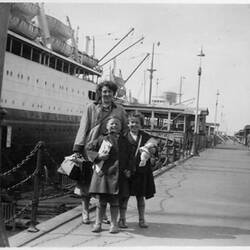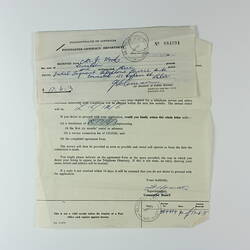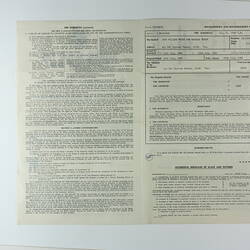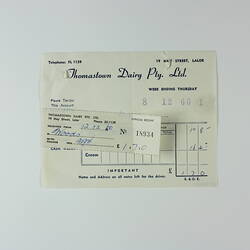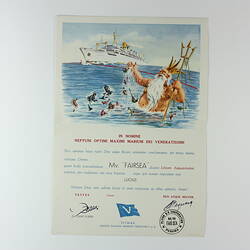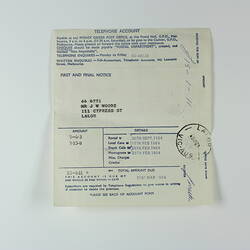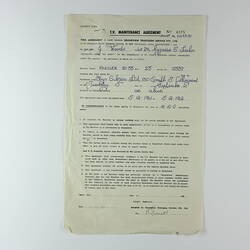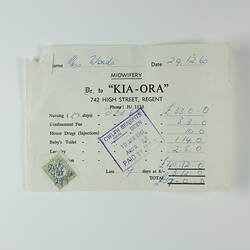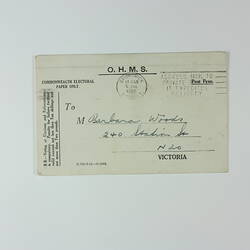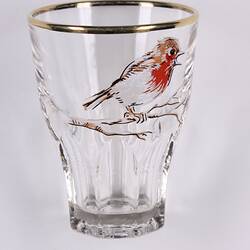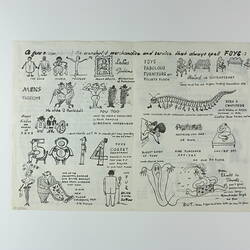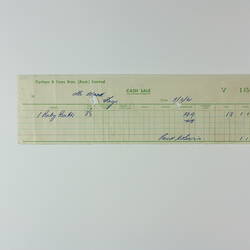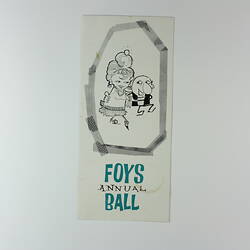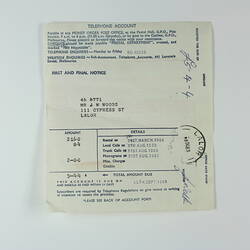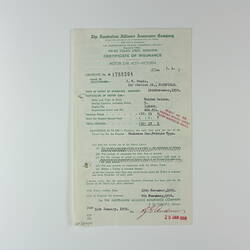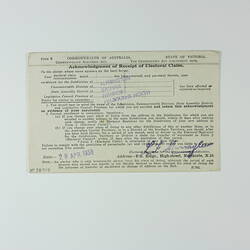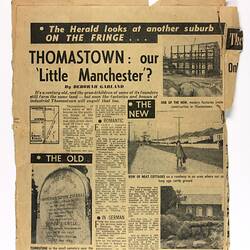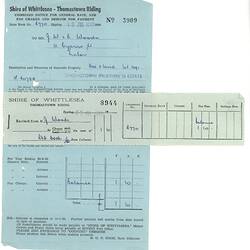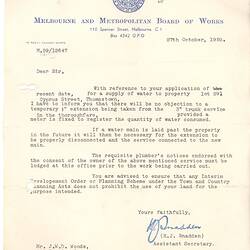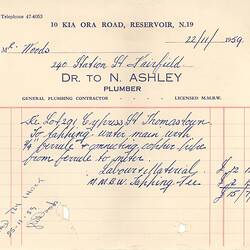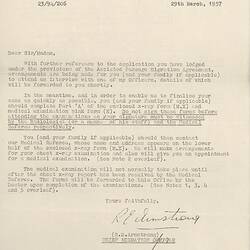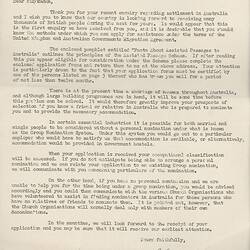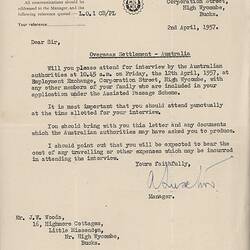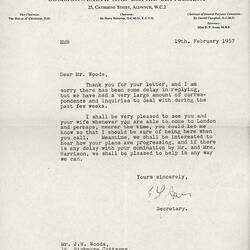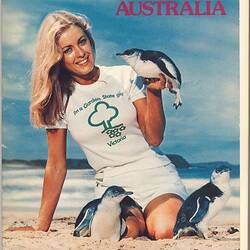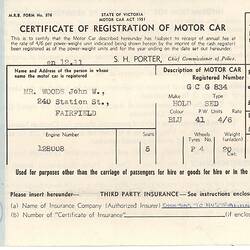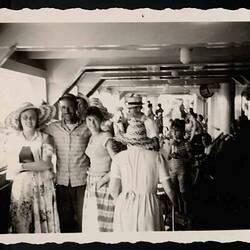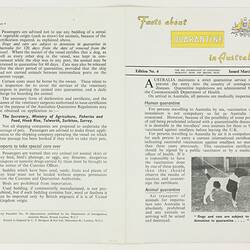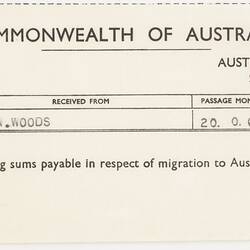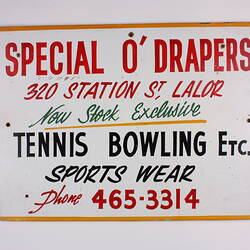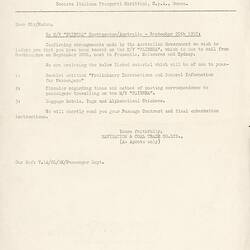Barbara (nee Wickson, born 3/8/1936) and John (born 28/12/1929) Woods migrated to Australia from England in 1957. Barbara was from High Wycombe in Buckinghamshire and worked for as a quality controller for an electrical valve company. John and Barbara met at a dance in High Wycombe.
They married in 1955 when Barbara was 19 years old, following a whirlwind, three month romance. They lived with extended family in commission housing in Little Missenden, Buckinghamshire. John secured employment in sales, working as a 'tally man' selling door-to-door haberdashery for Blundells. Barbara worked in Amersham at Brazils office which was closer to home (Little Missenden was a short bus drive away). But they were unable to obtain their own house. This motivated them to migrate to Australia, which they chose over Canada for its warmer climate.
They migrated on an Australian government assisted passage scheme in 1957, paying ten pounds for each ticket, in exchange for agreeing to remain in Australia for at least two years. Over one million 'ten pound tourists' or 'ten pound Poms' migrated to Australia from Britain between 1947 and 1972. They were also sponsored by friends of John's brother who were already in Australia which meant that they were picked up and stayed with these friends in Thomastown (rather than going through the hostel system). Barbara vividly remembers waking up in their bungalow to a vast blue sky, and the sound of kookaburras and magpies, so different from English birdsong.
Barbara and John travelled from Amersham to London by train, then caught the 'boat train'; witnessing the emotion of others who had relatives to see them off they were relieved they left on their own. Their two trunks containing mostly linen and clothes had gone on ahead; they carried a suitcase each with clothing. The couple boarded the Sitmar Line 'MV Fairsea' at Southampton which departed on 20 September 1957. A band was playing and the fog was heavy. The first shock was discovering that Barbara was sharing a cabin with 19 other women and the men were separated - the cabins were small and humid. The next shock was the shipboard cuisine - Italian food which they had never eaten before.
Barbara's diary describes their journey as a mixture of excitement, boredom and exotic foods and ports. John and friend Stan played a lot of cards; Barbara and friend Shirley (Stan's wife) enjoyed afternoon teas, reading in the library, washing, hanging clothes on lines strung on the deck (which occasionally went missing) and ironing. Barbara recalls a rough crossing through the Bay of Biscay and the beautiful seas of the Gibraltar Straits; the 'bum boats' selling exotic goods in Port Said (where Barbara purchased her handbag now in the museum's collection) but also the residual tension post the recent closing of the Suez Canal which had just reopened.
John had been one of the top three 'tally men in England and came out to run the door-to-door sales arm of the Foy and Gibsons department store in Melbourne and to train salesmen for the Whittlesea-Werribee area, but the job didn't start until February 1958. When they arrived they went through the Commonwealth Labour Exchange in Preston; John started as a tram conductor (which lasted six weeks and helped him find his way around Melbourne) and Barbara was employed in the accounts department at Nylex Industries in Abbotsford. John did then train and supervise the new salesmen, was given a Foys van and was given a percentage of their combined sales (later receiving a salary). the 'round' covered Glenroy, Dallas, Broadmeadows, Fawkner, Preston and Reservoir. He continued this work until the Foys door-to-door sales unit closed around the mid 1960s.
They first rented a flat in Fairfield and then in 1960 purchased two blocks in Thomastown for 350 pounds each and built their house on lot 291/111 Cyprus Street (many of the documents refer to the property as located in Lalor and the street is occasionally misspelt as 'Cypress'). Barbara recalls their neighbours being a cultural mix of German, Dutch, Italian, English, Maltese and Irish families. The roads were unmade and there was no sewerage. The couple lived there together until John's death in August 2012 (his ashes were taken back to England).
From 1966-1976 the couple owned and managed a drapery store in Station Street Lalor in the northern Melbourne suburbs. John made all the store fittings. He was also still operated his own 'tally run' while managing the store, purchasing his own van and fitting it out with shelving. Barbara worked in the store almost full time while raising their four children. Barbara walked one kilometre to the store each day with the children. The family did manage annual holidays to Portarlington for 19 years. Barbara and John never regretted their relocation; only the lack of an extended family structure was seen as a sad absence. The couple returned to England for the first time in 1986 for a holiday and over the years most of their UK relatives came to Australia for a visit, including John's mother at the age of 79 (she had never been on a plane or travelled further than to the seaside 40 kilometrss from her home).
The Barbara and John Woods Collection comprises documents, objects and photographs that provide a comprehensive insight into the Woods' immigration experience, from the issuing of their passage tickets, to their arrival and settlement in Melbourne. The collection includes the migration promotional booklets given to the Woods, tickets, ship menus, government booklets and documents received upon arrival, a handbag purchased from the side of the ship in Port Said, Egypt and photographs taken both during the voyage and of the working and social life in Melbourne. It also includes items relating to their drapery store in Lalor.
More Information
-
Keywords
-
Authors
-
Article types
